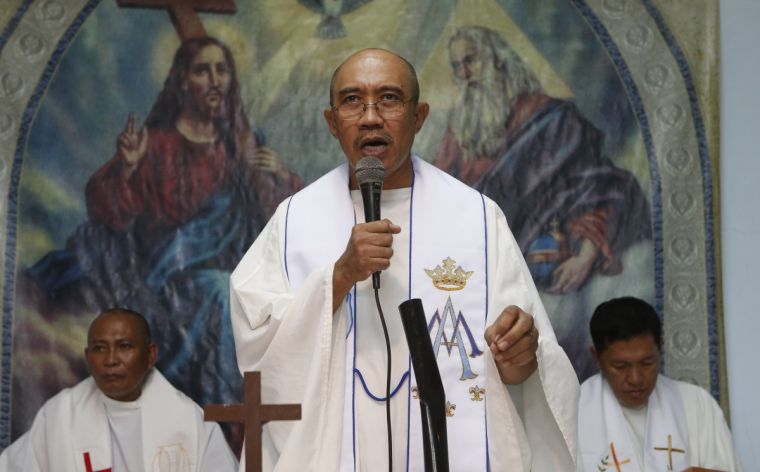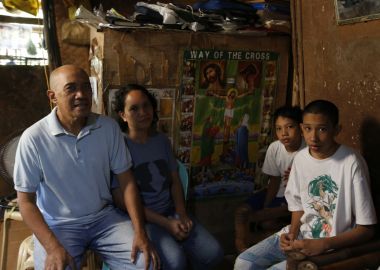Meet the Catholic priest who doesn't believe in celibacy

Every Sunday morning, dozens of Roman Catholics gather at a small chapel on an island in the central Philippines to listen to Father Jess Siva share his personal experiences as a priest, and as a parent.
Siva, 54, has been celebrating Mass in the town of Lambunao for the past 15 years, giving communion, performing last rites for the dying, hearing confessions and officiating at marriages.
But while his small flock admire him, Church leaders in the Philippines consider him persona non grata for failing to adhere to one of the most important tenets of the priesthood - abstaining from sex.
"This is a very serious problem within the Church," Siva, who is the father of two boys from a relationship with a member of his congregation's choir, told Reuters. "I hope Pope Francis will recognize us."
Although celibacy is not expected to be directly raised during the Pope's visit to the Philippines this week, some in the Church hope that the pontiff will in time listen to their pleas for change.
In the Philippines, which accounts for about half of Asia's Roman Catholics, Siva is not alone. A handful of priests have been asked to leave the priesthood for fathering children.
On January 11 Siva baptized the five-month-old son, and fourth child, of fellow Catholic priest Hector Canto. Siva officiated at Canto's marriage in 1997.
There are already high hopes the Argentine Pope will change the Church's traditional approach to issues such as sexual morality by becoming more welcoming to gays and easing restrictions on divorced and remarried Catholics.
Last year, Francis said he believes priests should be celibate but that the rule, which dates back over 1,000 years, could be changed someday.
"Celibacy is not a dogma," he said when asked by a reporter whether the Church might consider allowing priests to marry as they can in the Anglican, Protestant and Orthodox Churches.
"It is a rule of life that I appreciate very much and I think it is a gift for the Church but since it is not a dogma, the door is always open," he said.
The Church teaches that a priest should dedicate himself totally to his vocation, essentially taking it as his spouse, in order to help fulfill its mission.

Some have cited celibacy as one reason for the decline in men entering the priesthood.
In Africa, Catholic priests have openly questioned the celibacy rule, saying it is incompatible with their culture. African Archbishop Emmanuel Milingo was famously excommunicated in 2006 for ordaining four married men as priests as part of his group "Married Priests Now". Milingo himself married a Korean woman.
Africa and Asia have the fastest growing Catholic populations, and today they are home just over a quarter of the world's more than 1.2 billion Catholics.
The rule of celibacy has also been questioned in the Pope's own backyard. Last year, 26 women in love with priests in Italy wrote a letter urging him to make celibacy optional, describing the "devastating suffering" it causes.
"YOU ARE ON YOUR OWN"
Siva, who was ordained a priest in 1986 and started living with his partner 12 years later, is making little headway in persuading the Church's local leadership that it is time to change.
The archdiocese of Jaro, which includes the town of Lambunao, frowns upon his actions, saying the priestly activities of Siva, Canto and another priest, Elmer Cajilig, are "illicit".
"They are on their own," Jaro Archbishop Angel Lagdameo told Reuters. "They have violated our rules on celibacy. We do not recognize them."
But Filipino Catholic bishops have done nothing to stop the ministry of the three priests who have openly violated the Church discipline.
Monsignor Victorino Rivas of the neighboring Archdiocese of Bacolod said cases of priests with families are confidential and that there are no statistics on their numbers.
Siva told Reuters there were two more priests in Iloilo City who may join his self-styled ministry called "Compania de los Padres de Familia" (The Company of Priests with Families).
There are more than 3,000 priests in the Philippines, where about 80 percent of the 100 million population is Catholic.
Celibacy surfaced last year during a bitter battle over a contraceptive law, as supporters of the bill exposed priests who fathered children.
Priests who break the celibacy rule are usually put on sabbatical leave, suspended, transferred, made to undergo "formation", and advised to leave the priesthood to marry and start a family.
On Sunday, before the Pope's visit to Asia, Siva and the two other unchaste priests celebrated a mass to dramatize an appeal to him to show "mercy and compassion", the theme of his pastoral visit to the country.
In many remote communities, residents accept priests who fathered children because of the shortage of clerics. "What's more important is there is a priest in our village," said Jeremy David, a member of the Lambunao chapel choir.











